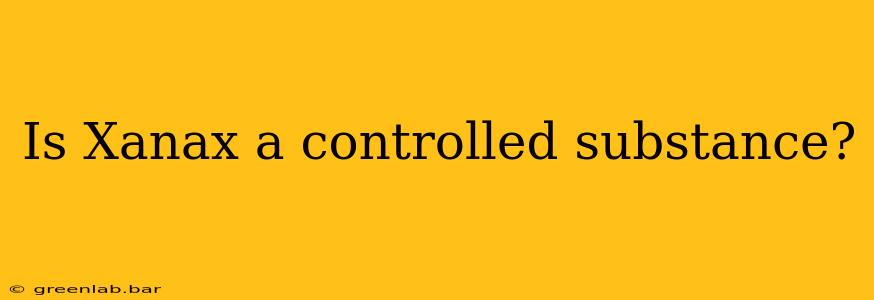Yes, Xanax, the brand name for alprazolam, is a controlled substance. This means its manufacture, possession, and distribution are regulated by the government due to its potential for abuse and addiction. Understanding the specific regulations surrounding Xanax is crucial for both patients using it for medical purposes and the general public.
Xanax's Legal Classification
Xanax falls under the Schedule IV category of controlled substances under the Controlled Substances Act (CSA) in the United States. This scheduling reflects its potential for abuse, although it's considered to be lower than Schedule II drugs like oxycodone or morphine. The Schedule IV classification means that prescriptions for Xanax are subject to certain restrictions, including limitations on refills and the requirement for a valid prescription from a licensed medical professional. The specific regulations can vary slightly depending on state laws, but the federal classification under Schedule IV is consistently applied.
Why is Xanax a Controlled Substance?
The controlled substance classification of Xanax stems from its potent effects on the central nervous system. Alprazolam, the active ingredient in Xanax, is a benzodiazepine that works by enhancing the effects of gamma-aminobutyric acid (GABA), a neurotransmitter that inhibits brain activity. This mechanism leads to its anxiolytic (anxiety-reducing), sedative, and muscle-relaxant properties. While these properties are therapeutically beneficial for treating conditions like anxiety disorders and panic attacks, they also contribute to the potential for abuse and dependence.
Risk of Abuse and Addiction
The calming and euphoric effects of Xanax can be highly addictive. Regular use, even at prescribed dosages, can lead to tolerance, requiring higher doses to achieve the same effect. Stopping Xanax abruptly after prolonged use can result in severe withdrawal symptoms, including anxiety, insomnia, seizures, and hallucinations, making it crucial to taper off the medication under medical supervision. Furthermore, mixing Xanax with other substances, particularly alcohol or opioids, significantly increases the risk of respiratory depression and overdose.
Legal Implications of Xanax Possession and Use
Possessing or using Xanax without a valid prescription is illegal and carries serious legal consequences. Penalties can range from fines to imprisonment, depending on the quantity of Xanax involved and the individual's prior criminal history. Furthermore, driving under the influence of Xanax is a serious offense, similar to driving under the influence of alcohol.
Seeking Help for Xanax Abuse or Addiction
If you or someone you know is struggling with Xanax abuse or addiction, help is available. Contact a medical professional or addiction specialist to discuss treatment options. There are various evidence-based treatment approaches available, including medication-assisted treatment and therapy. Resources like the Substance Abuse and Mental Health Services Administration (SAMHSA) National Helpline can provide confidential support and referrals to treatment centers.
Disclaimer: This information is intended for educational purposes only and does not constitute medical advice. Always consult with a qualified healthcare professional for any health concerns or before making any decisions related to your health or treatment. This article does not endorse or promote the misuse of Xanax or any other controlled substance.

